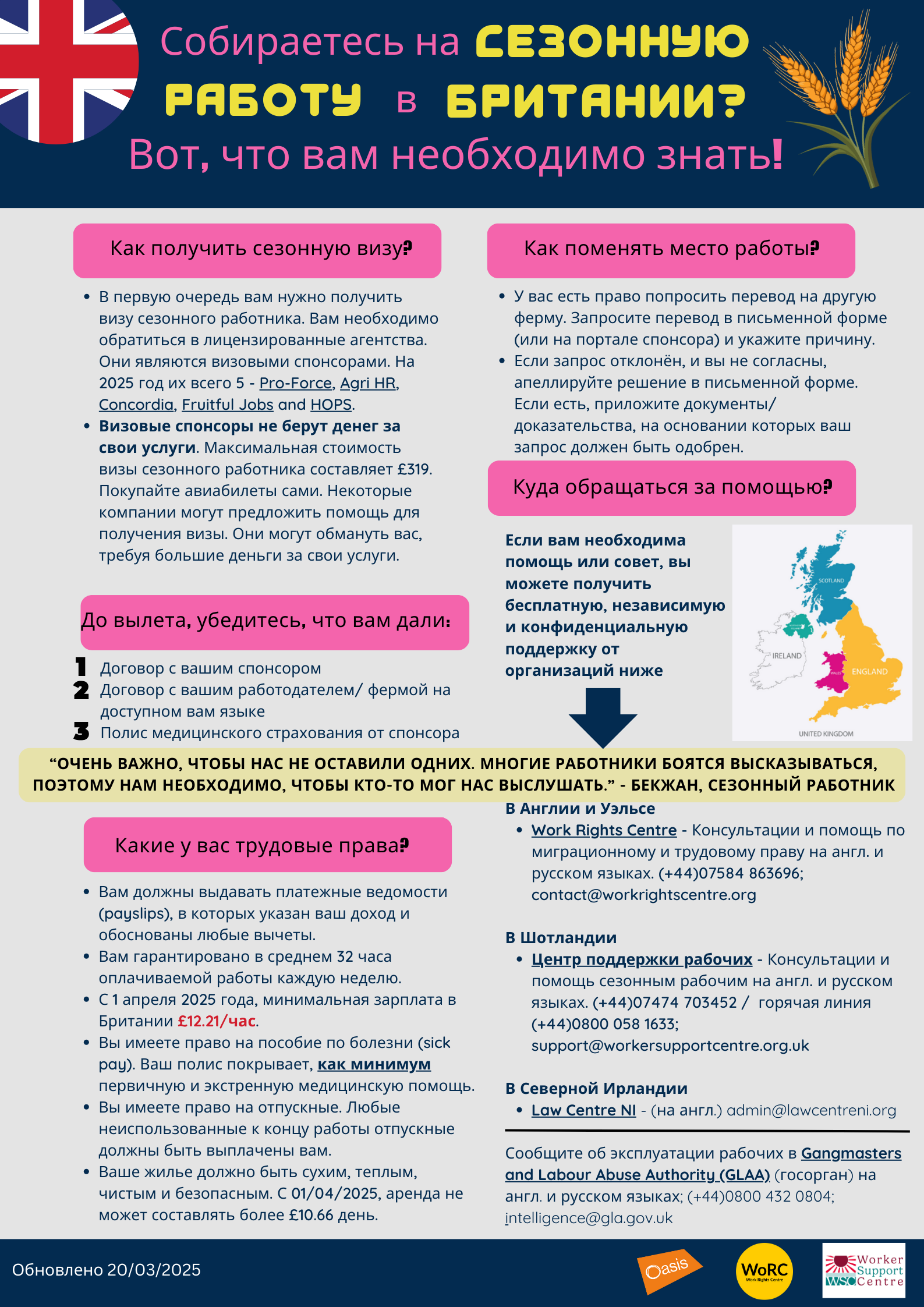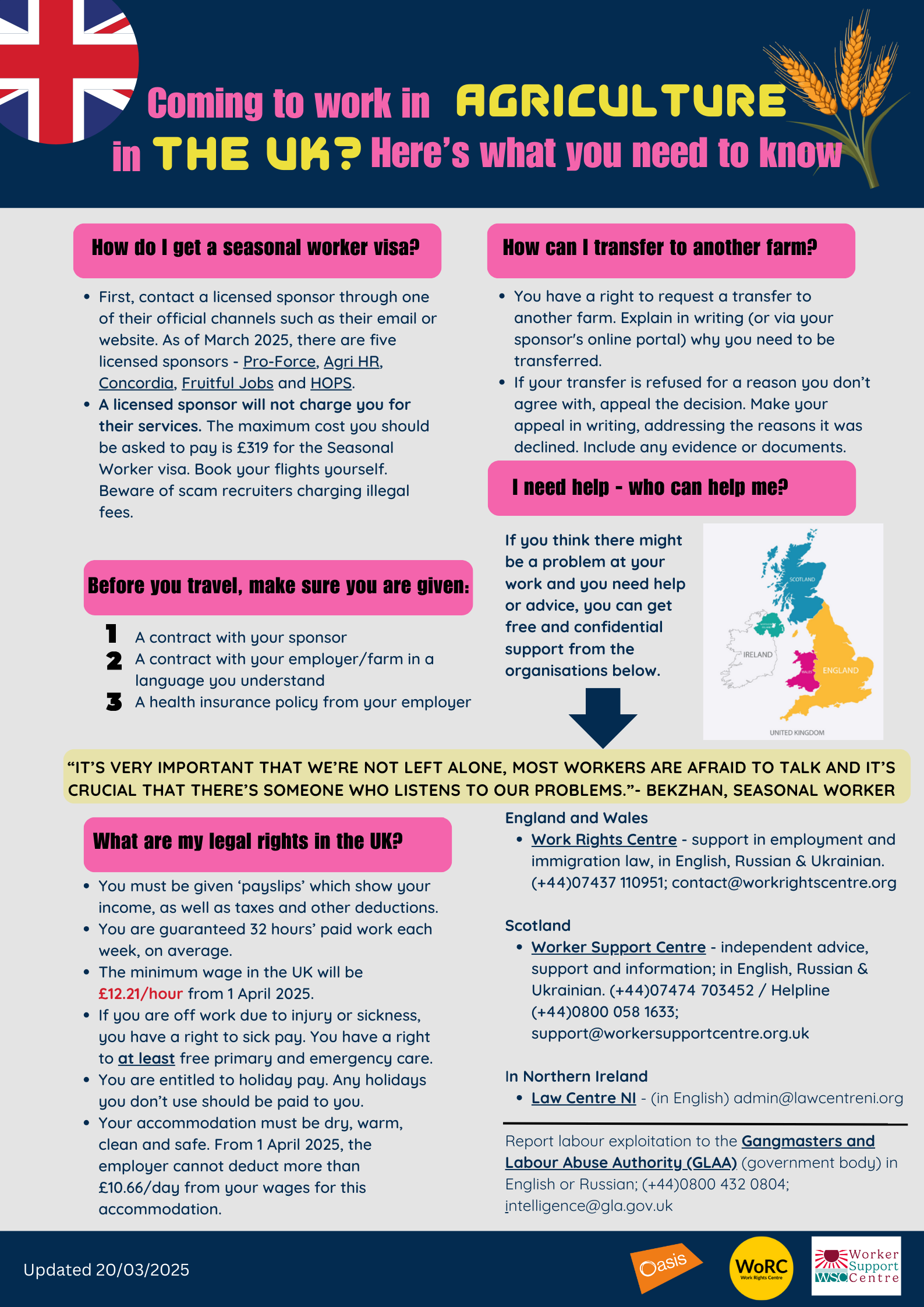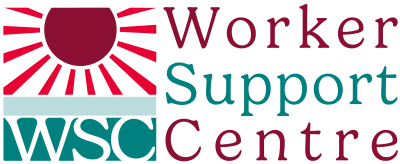For workers
What information should I expect from my employer?
Your employer must provide details of the terms and conditions of the work you will carry out in writing before your first day of work. This should at least include:
- who is employing you;
- your rate of pay;
- your working hours and holiday days – minimum 32 hours per week for workers on the Seasonal Worker visa;
- the location of your work.
You should have received an employment contract in your first language, as well as English. This contract must provide details of the hours you can expect to work.
You should receive a pay slip on or before the day you are paid which shows:
- Your pay, before and after deductions (such as deductions for your housing and travel if they were agreed with you in advance);
- tax and national insurance deductions required to be made by law;
- hours you worked;
- the ‘net’ amount on your pay slip (after deductions) must be the same as the pay you actually receive.
Should you not receive any of the above, discuss with your employer or you can contact the Worker Support Centre on 0800 0581 633, support@workersupportcentre.org.uk for further information.
What should I do if I’m being mistreated at work?
It is against the law in Scotland for an employer to discriminate against workers on the basis of age, sex, race, disability, marriage and civil partnership, sexual orientation, gender reassignment, pregnancy and maternity, and religion or belief.
It is against the law to offer less favourable pay and conditions to men and women for equal work or to offer less favourable pay and conditions to workers on the basis of their working pattern, for example, part-time or full-time or contract, fixed term or permanent unless it can be objectively justified by your employer.
If you or someone you know is a victim of any of these forms of discrimination, you can contact the Equality Advisory and Support Service for more information on 0808 800 0082 or contact the Worker Support Centre on 0800 0581 633 for further information.
Where can I get more information about my rights on the Seasonal Worker Visa?
You can download detailed information leaflets about your rights on the Seasonal Worker visa from the Scottish Government website or contact the Worker Support Centre on 0800 0581 633.
I'm in the UK on the Seasonal Worker visa do i need to pay to see a doctor?
Scotland
Migrant workers can get healthcare free of charge from the National Health Service (NHS) in Scotland.
Workers should register as an NHS patient with a family doctor – a General Practitioner (GP) – and will not have to pay for this. The GP can arrange an interpreter to facilitate engagement. At point of registration the GP may ask for some documents to prove an individual is in work, this could include proof of visa, a work contract or wage slip. Workers without a fixed address can also show the Access to Healthcare card to demonstrate entitlements and right to register without a fixed address. If the GP prescribes medication to a worker this is free to access from a pharmacy in Scotland.
Once registered most healthcare excluding dental treatment or eye care is free to workers this includes primary care, secondary care and emergency care. All services that are free to Scottish citizens are also free to migrant workers in Scotland.
England, Wales and Northern Ireland
Migrant workers on the Seasonal Worker visa can access primary healthcare, usually with a family doctor, and emergency healthcare, usually through the Accident and Emergency department of a hospital, on the National Health Service (NHS) free of charge.
Workers should register with a family doctor – General Practitioner (GP) – in order to access NHS services. No proof of status is required to access this, nor is an address required. In England only, if a GP prescribes medication to a worker there is a flat charge of £9.90 per item when medicine is accessed from a pharmacy. Prescriptions accessed from a GP in Wales or Northern Ireland and collected from a pharmacy in Wales or Northern Ireland are free of charge.
Emergency care, family planning, treatment via the Mental Health Act 1983, and treatment for some communicable diseases (eg HIV, TB, COVID 19 diagnosis and treatment) can also be accessed free of charge at hospitals.
If a worker on the Seasonal Worker visa requires secondary care, which includes treatment in a hospital usually with referral from a GP, this is usually not free, and a worker may need travel insurance to cover these costs. This insurance may be provided by your scheme operator, however some insurance policies do not cover the full amount. It is important to check how much is covered and if the scheme operator or the worker is expected to pay the remaining fee (“the excess”).
How do I contact the Worker Support Centre?
Helpline: 0800 058 1633
When:
At all other times there is an answer phone facility; please leave a message and we will respond as soon as a staff member is next available or e-mail: support@workersupportcentre.org.uk
We speak Ukrainian, Russian, Lithuanian, Hungarian, Kurdish Kurmanji, Italian, French, Spanish and English or can provide an interpreter.
I am on the Seasonal worker visa, how do I change employer?
Your visa sponsor (Scheme Operator) must set out clearly the way in which you can transfer employer, including criteria for making a request and a process for considering requests, before you start work.
Normally Scheme Operators must not refuse requests from workers to change farms, unless there are significant reasons not to permit a change.
If you have tried to access a transfer through your Scheme Operator and are still facing problems, contact the Worker Support Centre on 0800 0581 633 / support@workersupportcentre.org.uk
What information should I gather whilst at work?
Try to document information about your work to help understand any problems you may face. Useful information can include:
- Work completed – Write down the hours you work, when you start and finish, what breaks you take, what the work was and where the work took place.
- Pay – Document how much you should be paid for the work you have done (piece rate, hourly rate), then document how much money you receive in pay and keep hold of your pay slips.
- Contract – Keep hold of your contract and any other documents related to your accommodation or agreements eg on payments required by your employer.
- Place of work – Know the address of where you work.
how can i access the seasonal worker visa scheme?
You can find all the information on how to access the Seasonal Worker Visa scheme on the UK Government website: https://www.gov.uk/seasonal-worker-visa. You can also access this booklet on the sasa.gov.uk website which provides an overview of your rights and support in Scotland.
Please note that under the Seasonal Worker visa Scheme, you are allowed to come to the UK and work in:
• horticulture for up to 6 months
• poultry from 18 October to 31 December
https://www.concordiavolunteers.org.uk/
https://www.hopslaboursolutions.com/
Poultry sector recruitment :
https://www.rerecruitment.com/
What should I do if I think I’M at risk of human trafficking?
The following are signs of possible human trafficking for labour exploitation:
- deception or misleading information (oral or written) about the work and working conditions you would find;
- physical or sexual violence towards workers;
- intimidation or threats to workers and/or insulting behaviour to make them feel vulnerable;
- restriction of workers’ movements;
- pressure or force to work excessive overtime;
- abusive working and/or living conditions;
- making people work to pay off a debt that is ever increasing so that it gets much higher than its original value;
- keeping back wages or making high wage reductions in order to make workers stay in a job; and
- employers or visa sponsors holding on to passports and identity documents.
If you think you’re being trafficked, you can contact the police. In an emergency, call 999. For non emergencies, call 101.
if you do not want to speak to the police, you can call the Modern Slavery Helpline on 0800 0121 700 or fill out the Modern Slavery Helpline online form.
If you’re a victim of human trafficking the police or Modern Slavery Helpline will talk to you about what has happened, and refer you to a support provider who can provide safe accommodation for up to 90 days.
You can also contact the Worker Support Centre on 0800 058 1633; we will talk through your options in a language you understand and refer you to the organisation that is right for you.
Who funds the Worker Support Centre?
The Worker Support Centre is an independent organisation funded by the Scottish Government, the Joseph Rowntree Charitable Trust, the Allen Lane Foundation, the Robertson Trust, and Farming the Future.


